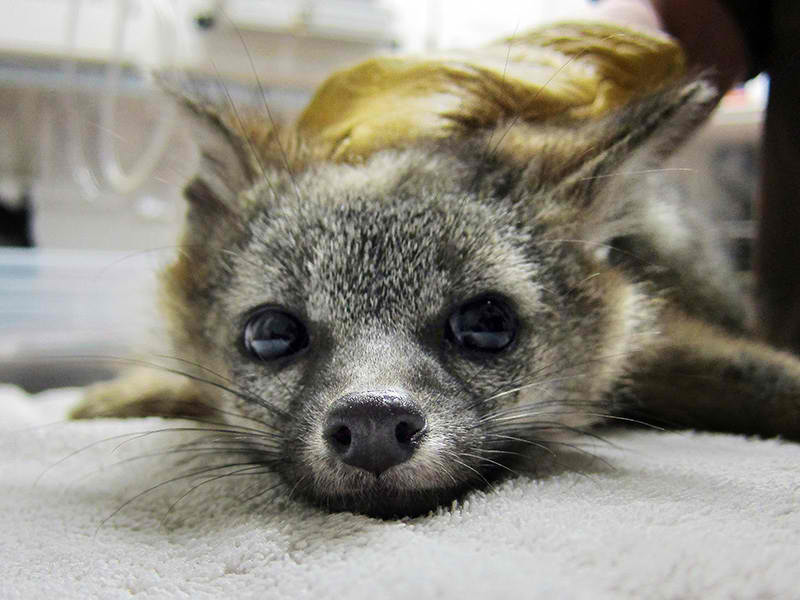Legal Action Taken to Reduce Wildlife Poisoning
Groups intervene in lawsuit by d-CON producers fighting California's controls on super-toxic rat poisons
Contact
A coalition of wildlife advocates intervened today in a lawsuit by the maker of the rat poison d-CON challenging a California effort to limit the sale of super-toxic rat poisons to only licensed specialists. The state’s new restriction on retail sales of the more deadly and longer-lingering rodenticides, due to take effect July 1, seeks to protect children, wildlife and pets from accidental poisoning.
Poisonings have been documented in at least 25 species of wild animals in California, including mountain lions, hawks, endangered San Joaquin kit foxes and northern spotted owls, as well as numerous cats and dogs.
“Reckit Benckiser is a multinational corporation motivated by sheer profit,” said Tamara Zakim, an associate attorney with Earthjustice. “In the face of an overwhelming tide of science that demands protections for birds and mammals that are harmed and killed by the pervasive and toxic effects of d-CON, California has taken important steps to protect wildlife. And yet Reckitt is fighting back in the name of business as usual.”
The regulations from the California Department of Pesticide Regulation target products sold to the general public in retail outlets and limits super-toxic rodenticide use beyond 50 feet of manmade structures. These super-toxic poisons—called second-generation anticoagulant rodenticides—will still be available for widespread use by licensed commercial and agricultural pest-control operators.
“It’s disgusting that d-CON continues to challenge common-sense controls for protecting our children, pets and wildlife,” said Jonathan Evans, toxics and endangered species campaign director at the Center for Biological Diversity. “We need to put public safety before corporate profits.”
Reckitt Benckiser is the parent company of d-CON and is also currently challenging a decision by the Environmental Protection Agency to limit the sale of super-toxic rat poison without tamper-resistant packaging to avoid unintentional poisonings of children.
“So much for corporate responsibility,” said Jason Rylander, senior attorney with Defenders of Wildlife. “Now that both EPA and the state of California have moved to curb the use of d-Con and other risky poisons, Reckitt Benckiser needs to do the right thing and stop fighting these common-sense measures to stop accidental poisonings.”
“We commend the state of California for taking action to protect people and animals,” said Cynthia Palmer, pesticides program manager at American Bird Conservancy. “It is time for the d-CON company to follow the rules like every other rat-poison manufacturer.”
“The lingering effects of the rat poison wreak havoc up the food chain, impacting endangered species such as the San Joaquin kit fox, and Reckitt Benckiser's intransigence is calculated to make its environmentally devastating product linger on the market," said Andrew Christie, director of the Sierra Club's Santa Lucia Chapter.
Earthjustice is representing wildlife advocates at the Center for Biological Diversity, Sierra Club, Defenders of Wildlife and the American Bird Conservancy in the lawsuit where the groups intervened to join the state of California in fighting Reckitt Benckiser’s attempt to roll back safeguards for rodenticides. Earlier this month Reckitt Benckiser failed to obtain a preliminary injunction to halt the new rule, which will go into effect on July 1.
Background
Anticoagulant rodenticides interfere with blood clotting, resulting in uncontrollable bleeding that leads to death. Second-generation anticoagulants—including the compounds brodifacoum, bromadiolone, difethialone and difenacoum—are especially hazardous and persist for a long time in body tissues. These slow-acting poisons are often eaten for several days by rats and mice, causing the toxins to accumulate at many times the lethal dose in their tissues, poisoning predators that eat the weakened rodents.
Studies have documented second-generation anticoagulants in more than 70 percent of wildlife tested, including eagles, hawks, owls, foxes, bobcats and mountain lions. Over a 10-year period rodenticides caused, on average, more than 160 severe poisonings of pets annually. According to data from the EPA, each year up to 10,000 children are accidentally exposed to rat poison in their homes.
Along with its recent challenge of the EPA’s proposal to require tamper-resistant packaging to protect children, Reckitt Benckiser has repeatedly fought attempts by regulators to limit unintentional poisonings. The EPA initially proposed protections for children and pets from rat poisons as early as 1998, but withdrew that proposal in the face of industry opposition. Ten years later, in 2008, the EPA moved forward with restrictions that have been repeatedly challenged by Reckitt Benckiser.
Safe alternatives to rat poison can be used to address rodent outbreaks in homes and rural areas. Effective measures include rodent-proofing of homes and farms by sealing cracks and crevices and eliminating food sources; providing owl boxes to encourage natural predation; and utilizing traps that don’t involve these highly toxic chemicals. For more information visit SafeRodentControl.org.

Additional Resources
About Earthjustice
Earthjustice is the premier nonprofit environmental law organization. We wield the power of law and the strength of partnership to protect people's health, to preserve magnificent places and wildlife, to advance clean energy, and to combat climate change. We are here because the earth needs a good lawyer.